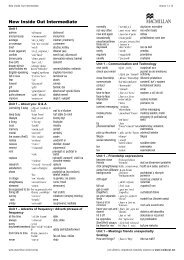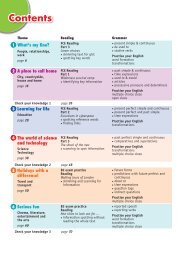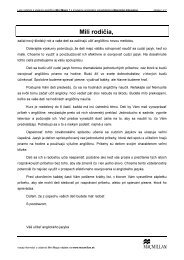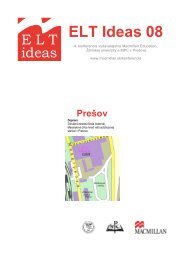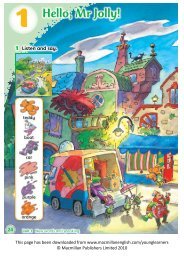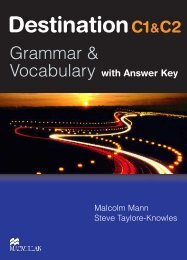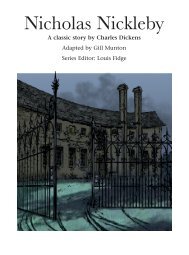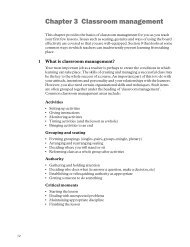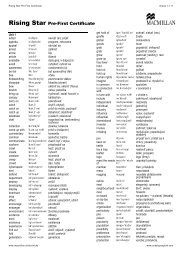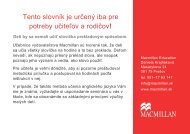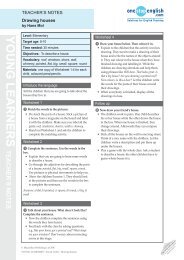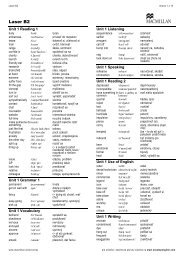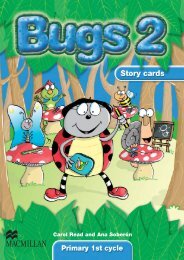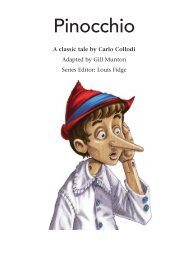ELT Ideas 06 - Macmillan Education
ELT Ideas 06 - Macmillan Education
ELT Ideas 06 - Macmillan Education
You also want an ePaper? Increase the reach of your titles
YUMPU automatically turns print PDFs into web optimized ePapers that Google loves.
E L T<br />
ideas<br />
<strong>ELT</strong> <strong>Ideas</strong> <strong>06</strong><br />
2. konferencia vydavateľstva <strong>Macmillan</strong> <strong>Education</strong> a Žilinskej univerzity<br />
www.macmillan.sk/konferencia<br />
Adresa ubytovania<br />
Ubytovacie zariadenie Veľký diel, ul. Vysokoškolákov,<br />
Žilina.<br />
Doprava<br />
Autobusová zastávka MHD je hneď pri vlakovej stanici,<br />
kde treba nastúpiť na linku 4 alebo 14 a vystúpiť na<br />
Obchodnej ulici.<br />
Registrácia<br />
Veľký diel, budova NR<br />
Otvorenie a plenárne zasadnutie<br />
Veľký diel, budova NR (piatok a sobota ráno)<br />
Recepcia<br />
Stravovacie zariadenie Žilinskej univerzity, Veľký diel,<br />
Nová menza<br />
Prezentácie, sobota<br />
Veľký diel, budova NS<br />
Tento program si vytlačte a prineste so sebou. Na mieste už nebude k dispozícii.<br />
Please print the programme out as copies will not be available on the day.
14.30<br />
15.45<br />
16.00<br />
17.15<br />
17.30<br />
18.30<br />
19.00<br />
21.00<br />
Susan House:<br />
Songs as a vehicle<br />
for language<br />
learning (room NS1)<br />
FRIDAY<br />
registrácia<br />
Philip Kerr: The role of affect in learning to speak (room NR2)<br />
Jon Hird: Move up,<br />
down and inside<br />
out (room NS2)<br />
Ken Wilson: Giving<br />
something extra<br />
(room NS10)<br />
Fergal Kavanagh:<br />
Culture begins at<br />
home (room NS11)<br />
<strong>Macmillan</strong> Reception (menza)<br />
Alena Rebrová:<br />
British Council<br />
activities in<br />
Slovakia (room<br />
NS15)<br />
Viera Bačová:<br />
Jazykové pobyty v<br />
UK (room NS16)<br />
8.30<br />
10.00<br />
NS1<br />
NS2<br />
NS10<br />
NS11<br />
NS15<br />
NS16<br />
SATURDAY<br />
Ken Wilson: Chair, charity, charismatic – does the method of teaching new words change as the students<br />
move up a level (room NR2)<br />
10.15 – 11.00 11.00–11.30 11.30 – 12.30 12.30–14.00 14.00 – 15.00 15.15 – 16.00<br />
Jon Hird: How a<br />
Jon Hird: Teaching In<br />
dictionary works,<br />
Company<br />
starring the MED.<br />
Ondřej Matuška: Free<br />
resources on the<br />
internet<br />
Lucia Hlubeňová:<br />
Culture Shock<br />
Susan House: Talking<br />
tasks<br />
Jana Bérešová:<br />
Insights into<br />
achievment standards<br />
Eva Hrašková: Little<br />
Bugs in our classroom<br />
Daniela Krajňáková:<br />
Move<br />
COFFEE<br />
BREAK<br />
BOOK<br />
DISPLAY<br />
BOOK<br />
SALE<br />
Ken Wilson: Having fun<br />
with active grammar<br />
Fergal Kavanagh:<br />
Inspiration<br />
Pehilip Kerr: You can't<br />
do that!<br />
Paul McCullough: Inside<br />
Out – the Nickel Tour<br />
Lucia Hlubeňová: Be<br />
Inspired<br />
LUNCH<br />
BOOK<br />
DISPLAY<br />
BOOK<br />
SALE<br />
Susan House: Story<br />
based learning<br />
Fergal Kavanagh: Tune<br />
Into English<br />
Philip Kerr: A licence to<br />
drill: a reappraisal of<br />
controlled practice<br />
Danica Gondová:<br />
Testing Oral Skills<br />
Lucia Hlubeňová: Miss<br />
Textbook 20<strong>06</strong><br />
Opakovanie<br />
najúspešnejších<br />
seminárov.<br />
Sledujte informácie v<br />
budove.<br />
Repetition of the most<br />
wanted talks.<br />
Watch for information in<br />
the conference building.
strana 3 z 6<br />
PROGRAMME<br />
(in alphabecial order by the speaker's name)<br />
Abbreviations<br />
P – Primary (1. stupeň ZŠ), LS – Lower Secondary (2. stupeň ZŠ, 8ročné gymnázia), US – Upper Secondary<br />
(stredné školy) T – Tertiary (vysoké školy, výučba dospelých), PLS – Private Language Schools (jazykové školy)<br />
Bačová, Viera<br />
SPŠ, Bratislava<br />
Target audience: all<br />
Jazykové pobyty v UK.<br />
Každý, kto má záujem vycestovať so študentmi do anglického Devonu, neplatiť žiadne peniaze, stráviť 13 dní v kolektíve študentov a<br />
kolegov, z toho 10 dní priamo v Barntstaple, rozprávať, bývať a stravovať sa v anglických rodinách, študovať spolu so žiakmi 20 hodín<br />
angličtiny v škole a na záver, podeliť sa so zážitkami so svojimi priateľmi, navštívte moju prednášku a v priebehu 45 minút sa<br />
rozhodnete cestovať so mnou. Možnosť pozerať krátke DVD o Barnstaple a výletoch, kde pocestujete.<br />
Bérešová, Jana<br />
Trnavská univerzita<br />
Target audience: US<br />
Insights into achievement standards - the Slovak matricular examination in English<br />
- based on the Common European Framework of Reference.<br />
The presentation is aimed at comparing the recommendations of the CEFR as the basis of language standards on different levels of<br />
language acquisition. Several examples of students’ papers and their oral performances will be presented, discussed and commented<br />
on.<br />
Gondová, Danica<br />
Žilinská univerzita<br />
Target audience: US<br />
Testing Oral Skills<br />
The workshop focuses on three different task types used for testing oral skills in the internal Maturita examination. It deals with the<br />
differences in language elicited in the three different tasks, is concerned with advantages and disadvantages of the tasks, and<br />
discusses how the various tasks can influence the performances of individual students and their achievements. The workshop also<br />
deals with the roles and behaviour of the assessors and the interlocutor.<br />
Jon Hird<br />
I divide my time between teaching and writing <strong>ELT</strong> materials in Oxford UK, where I have taught for about fifteen years. During this time I<br />
have also taught in Paris, Macedonia and very briefly in India and Vietnam while travelling through. I have authored or contributed to<br />
several <strong>ELT</strong> books, including the Inside Out, In Company and the soon-to-be-published Move series as well as a number of other <strong>ELT</strong><br />
resource books and Internet-based writing projects. I particularly enjoy giving talks and workshops in different countries and meeting the<br />
teachers and students, that may, or may not, use our books. I enjoy the challenge, in both my writing and teaching, of trying to make<br />
classroom activities as meaningful, engaging and as enjoyable as possible. My ambition is to one day find the time to pick up my<br />
drumsticks and play the drums again.<br />
Hird, Jon<br />
<strong>Macmillan</strong><br />
Target audience: US, T, PLS<br />
Move up, down and inside out<br />
I grammar, you grammar, he grammars, she grammars… This session addresses the questions of what is grammar, how we learn it<br />
and how this can be reflected in the classroom. We will look at a range of practical classroom activities and techniques that make<br />
practising grammar more meaningful, memorable and fun.<br />
Target audience: T, PLS<br />
Teaching In Company<br />
What exactly is Business English What is the tip of the iceberg And where do horoscopes, seafood and Chardonnay fit in This<br />
practical session explores these questions by drawing on the features and ethos of In Company, the Business English Course from<br />
<strong>Macmillan</strong>.<br />
Target audience: all<br />
How a dictionary works, starring the MED.<br />
Is I or you more common in English Which day of the week is most and least mentioned What is the favourite word of learners of<br />
English This session focuses on how a dictionary is put together, what features a good dictionary should have and how to make the<br />
most of one in class. There is also a quiz with a dictionary as the prize!<br />
Hlubeňová, Lucia<br />
EU, Ústav jazykov, Bratislava, <strong>Macmillan</strong> <strong>ELT</strong> Consultant<br />
Target audience: LS, US, T, PLS<br />
Culture Shock<br />
For the past thirty years psychologists and anthropologists have been studying the reactions and experiences during the first few<br />
months in a new country of travellers, diplomats, business people and international students. Research has proven that what most of<br />
people have in common is a series of reactions to the new culture. Culture shock might affect people to different degrees, but there is<br />
a predictable sequence of stages that people undergo. Learn how you can teach this interesting issue in your class.
strana 4 z 6<br />
Target audience: LS, US, PLS<br />
Be Inspired<br />
Do we teach enough culture or is there no time left for this issue How to find the right and appropriate balance between the Slovak<br />
culture and the culture of Anglophone countries We will try to answer all the questions above and you can acquaint yourselves with<br />
the new activities which will help you to teach culture in your class.<br />
Target audience: LS, US, PLS, T<br />
Miss Textbook 20<strong>06</strong><br />
Have you ever chosen a text-book which did not fulfil your expectations Are you satisfied with your present text-book What criteria<br />
do you have for selecting your text-book During this presentation you will learn how to choose a text-book which would later become<br />
your “Miss”.<br />
Susan House<br />
Susan House works as a teacher trainer in various countries including Spain, Italy, Portugal, Colombia, Argentina and Brazil. She works<br />
for the local education authorities in the different regional administrations in Spain. Her areas of expertise include:<br />
Early reading skills and phonics.<br />
Process writing and creative writing.<br />
Common Language frameworks and portfolio assessment.<br />
CBI (Content based instruction).<br />
Assessment and evaluation (Oral and written).<br />
Bridging the gap (strategies for the transition from primary to secondary).<br />
She is the co-author of Story Magic, a primary course from <strong>Macmillan</strong>.<br />
House, Susan<br />
<strong>Macmillan</strong><br />
Target audience: P, LS<br />
Songs as a vehicle for language learning<br />
In this session we are going to look at ways of using songs for language learning both in terms of developing different skills and in<br />
terms of tracking language progression. We will be using songs to work with: memory, pronunciation and intonation, movement to<br />
demonstrate meaning, songs to work with the progression of language learning through oral recognition to free production of new<br />
language. There are a lot of songs available and it can be difficult to choose the most appropriate. We want to use songs that will<br />
maximise the possibilities of language learning so we will be working with songs that have been specially written for teaching English.<br />
Target audience: P, LS<br />
Talking tasks<br />
As we work through the target language for each unit of work there comes a point when we want the pupils to start using the language<br />
for oral communication so that it doesn’t just settle into some far corner of their minds as abstract theory. This means setting up an<br />
activity in which the pupils will use the target language to communicate with each other. Young learners find it much easier to do this if<br />
we set them up with a communicative purpose and especially if they have something physical to use. This is where cut outs and craft<br />
type activities come into their own in the classroom. In this session we will be looking at these activities and analysing the<br />
development of communicative skills.<br />
Target audience: P, LS<br />
Story based learning<br />
In this workshop we will be examining the following questions: What is story based learning – Why are stories are good vehicle for<br />
language learners – What are the characteristics of young learners – How do I tell a story – How can I address all the skills –<br />
How can I use multidisciplinary links – How can I integrate cross curricular issues We will be working with a story for primary school<br />
students and seeing how to exploit the story in the classroom.<br />
Hrašková, Eva<br />
freelance<br />
Target audience: P<br />
Little Bugs in our classrooms<br />
Being a teacher of 6-7 year olds sometimes reminds me of standing in the middle of a busy and noisy anthill. You can’t possibly get<br />
rid of them but there are some ways how to stop them „biting you“ and make your life easier. Just offer the ants what they like, bring<br />
their attention to something better than your nerves and you might be as happy as them. There are things and activities which always<br />
keep my children talking English (drilling some grammar or learning a nice bunch of new words while playing ) – and me feeling happy<br />
with my „little bugs“.<br />
Fergal Kavanagh<br />
Fergal first started collaborating with <strong>Macmillan</strong> in 1996, and has given talks throughout Italy, Bulgaria, Turkey and Ireland. This is his<br />
first visit to Slovakia. He currently teaches at the Università degli Studi di Napoli ”L’Orientale”, Italy, but through his website<br />
www.tuneintoenglish.com he promotes the use of songs as his preferred method of teaching.<br />
Kavanagh, Fergal<br />
<strong>Macmillan</strong><br />
Target audience: US, PLS<br />
Inspiration<br />
Thomas Edison said "Genius is one percent inspiration, ninety-nine percent prespiration". The great inventor died in 1931, but if he<br />
were alive to see <strong>Macmillan</strong>'s latest title, he would certainly greatly reduce the ratio - using Inspiration in the classroom will reduce<br />
your students' English language learning prespiration! We take you through a sample unit to show you how to get the most from the<br />
book.
strana 5 z 6<br />
Target audience: US, PLS, T<br />
Culture Begins At Home<br />
Can we teach Culture effectively if students don't first understand their own culture This workshop suggests reflecting on the home<br />
culture while looking at those of English-speaking nations.<br />
Target audience: all<br />
Tune Into English<br />
One of the best ways to involve students in the learning process is to use music and song. We show how songs fix vocabulary and<br />
structures into long-term memory and look at practical examples that you can use in your classroom.<br />
Philip Kerr<br />
Philip Kerr is a well-known writer of English language teaching materials and he is the main author of Straightforward, the new series of<br />
coursebooks from <strong>Macmillan</strong>. His work as a teacher, teacher trainer, director of studies and university lecturer has taken him to many<br />
countries around the world. He currently lives and works in Brussels.<br />
Kerr, Philip<br />
<strong>Macmillan</strong><br />
Target audience: all<br />
The role of affect in learning to speak<br />
Getting students to speak at all in class can be hard enough. Getting students to take part in fluency activities can be harder still. A lot<br />
depends on how students feel about the classroom environment and the activities which we ask them to take part in. Teachers cannot<br />
control how students feel, but there is much that we can do to influence their feelings. Using illustrations from Straightforward, the new<br />
coursebook for adults and young adults from <strong>Macmillan</strong>, this workshop will explore how the teacher's management of classroom<br />
speaking activities can encourage both language development and learner autonomy.<br />
Target audience: US, PLS, T<br />
You can't do that!<br />
The world of English language teaching has seen many changes in the last twenty years, as new fashions come and old fashions go.<br />
For example, communicative language practice, authentic language examples and guided discovery techniques are currently held up<br />
as examples of good practice, while the use of mother tongue, translation and dictation are often disapproved of. This talk will reevaluate<br />
a variety of both fashionable and unfashionable classroom activities and suggest that we should be very cautious about<br />
following passing fashions. The talk will be illustrated with activities from Straightforward, the new coursebook for adults and young<br />
adults from <strong>Macmillan</strong>.<br />
Target audience:US, PLS, T<br />
A licence to drill: a reappraisal of controlled practice<br />
Controlled practice is usually seen as a classroom activity that belongs to a traditional product-oriented approach to language<br />
teaching. After a brief consideration of the differences between product-oriented and process-oriented approaches, this talk will<br />
explore a variety of controlled practice activity types and reappraise the value of such tasks. The talk will be illustrated with activities<br />
from Straightforward, the new coursebook for adults and young adults from <strong>Macmillan</strong>.<br />
Krajňáková, Daniela<br />
<strong>Macmillan</strong> Slovakia<br />
Target audience: PLS, T<br />
Move<br />
Do you struggle to finish your coursebook in time Do you teach in short courses or do you have only a few lessons a week Move, a<br />
new <strong>Macmillan</strong> coursebook, is the solution to your problems. It is suitable for language schools, universities and company courses.<br />
Matuška, Ondřej<br />
<strong>Macmillan</strong> Czech Republic<br />
Target audience: all<br />
Free Resources on the Internet: onestopenglish.com<br />
The talk introduces www.onestopenglish.com, a website for teachers of English, where users can download hundreds of ready made<br />
materials. The themes range from teaching children, speaking lessons, teaching vocabulary to ESP and exam preparation. All<br />
services are provided free of charge. Come and learn how you can save time and effort if you become regular users!<br />
McCullough, Paul<br />
freelance<br />
Target audience: US, PLS, T<br />
Inside Out - the Nickel Tour<br />
During this interactive session we will look at the features that have helped to make Inside Out one of the best selling titles from the<br />
<strong>Macmillan</strong> list. As usual, we will learn by doing. So, come prepared to talk!!!<br />
Rebrová, Alena<br />
The British Council, Slovakia<br />
Target audience: all<br />
British Council activities in Slovakia<br />
The presentation is aimed at those teachers and educators who want to gain an insight into the British Council activities in Slovakia. It<br />
will highlight the work we do for teachers of English. It will inform the audiences of planned developments and will outline our future<br />
projects in Slovakia.
Ken Wilson<br />
strana 6 z 6<br />
Ken Wilson is a teacher trainer and an author of <strong>ELT</strong> materials with more than 20 titles to his name, including Move Ahead, the five-level<br />
series for upper primary and secondary published by <strong>Macmillan</strong>. His other <strong>Macmillan</strong> book projects include New Standard English, an<br />
11-level Senior High series for China and Prospects, a six-level secondary school course for Central Europe. He is also co-author of<br />
English Sketches, two books which contain transcripts of 32 sketches by the English Teaching Theatre, and accompanying drama<br />
material.<br />
In addition to print materials, he has written more than 100 radio and TV programmes for BBC English, including 50 radio scripts for the<br />
Follow Me series and 30 Look Ahead TV scripts. Until 2002, Ken was artistic director of the English Teaching Theatre, a company which<br />
toured the world performing stage-shows for learners of English. The ETT made more than 250 tours to 55 countries, in Europe, Latin<br />
America, Africa and the Far East. The stage-show was discontinued in 2002 but ETT performers continue to give drama workshops and<br />
courses all over the world.<br />
Ken is a regular at IATEFL and TESOL conferences around the world, usually giving workshops on music and drama in <strong>ELT</strong>. He has<br />
also given conference plenary talks in many countries. including Argentina, Brazil, China, Greece, Korea, Turkey and almost<br />
everywhere in Central and Eastern Europe.He has worked as a writer and adviser on <strong>ELT</strong> television projects in many different countries,<br />
including Poland, Portugal and the Netherlands. He wrote and presented a series of drama training programmes for Polish TV, which<br />
was first broadcast in 1997 and has been shown several times since. In 2005, he worked on UK TV Channel 4's first-ever <strong>ELT</strong> TV<br />
series, Extra English.<br />
Wilson, Ken<br />
<strong>Macmillan</strong><br />
Target audience: all<br />
Chair, charity, charismatic – does the method of teaching new words change as<br />
the students move up a level<br />
Teaching vocabulary is pretty important - you can't do anything without words, and students won't make any progress without a<br />
constant stream of new ones. But for some students, words get harder the more you learn. Why should this be It is because more<br />
complex words are more difficult to learn Or is it that we aren't teaching them right Why is it that young learners seem to remember<br />
how to use simple words like 'chair' very easily, whereas older learners might know what words like 'charity' and 'charisma' mean, but<br />
can't pronounce them correctly, don't know the adjectival forms and can't collocate them Is it simply a matter of teaching collocations<br />
rather than words Or do we need to go back to primary level, and remember what it was that made words so memorable for younger<br />
learners Most important - how can we get the students actively involved in learning new words And what can we do to help<br />
students memorise words<br />
Target audience: US, PLS<br />
Having fun with active grammar<br />
In this workshop, Ken looks at grammar in the same way he looked at vocabulary in his plenary. He will try to show how you can<br />
make grammar more active and involving for the students. He will show how to devolve more responsibility onto the students for input<br />
lessons and turn grammar teaching into a dialogue of discovery. We will look at ways of exploiting the abilities that students have (and<br />
teachers often don't) to draw pictures, to mime, to indicate emotions with facial expressions, to make sounds and to act as trees. Yes -<br />
act as trees. I promise it will all make sense!<br />
Target audience: all<br />
Giving something extra<br />
Grammar, vocabulary, tests, exams - is that all there is to English classes Thankfully not! There are lots of extra activities, designed<br />
especially to fill those moments when energy levels (of teachers and students) are low. . Every teacher needs a portfolio of extra<br />
ideas to waste, sorry, to FILL a little time here and there. Today, Ken will try to add 10 brilliant ideas to your list of extra time-fillers.



